Key takeaways:
- Ocean conservation is vital for combatting pollution, overfishing, and climate change, impacting both marine health and human survival.
- Marine volunteering fosters community connection and personal growth, enhancing skills in ecological knowledge and communication.
- Participants face challenges such as environmental damage and physical demands, which can motivate stronger advocacy for ocean protection.
- Effective volunteer work includes education and collaboration, leading to profound impacts on local communities and ecosystems.
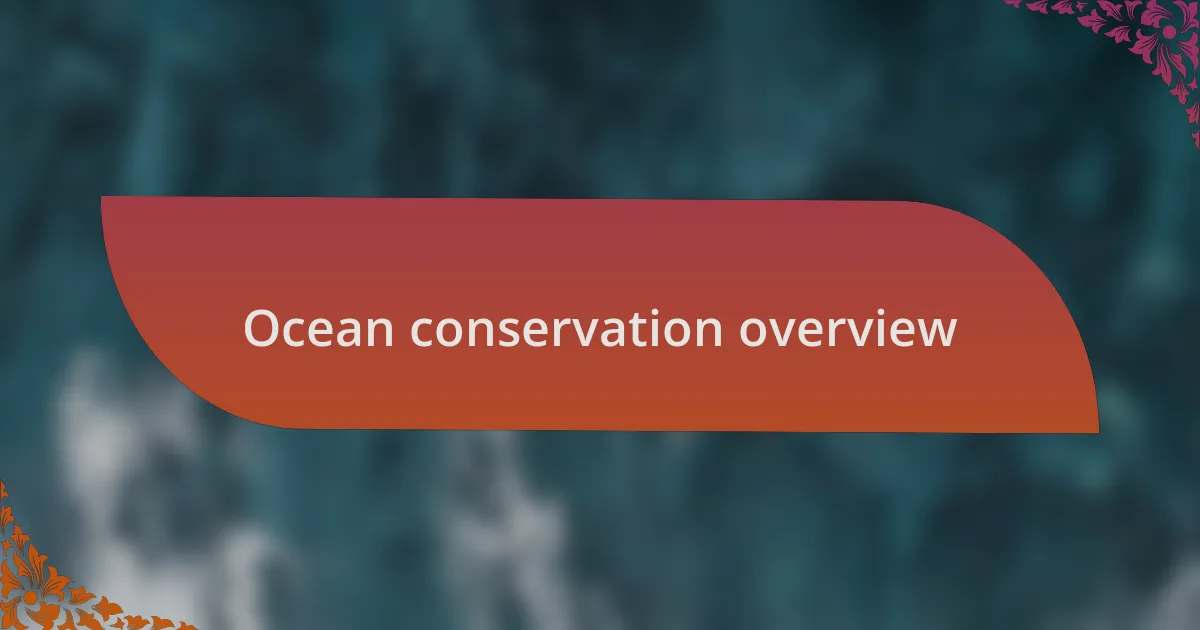
Ocean conservation overview
Ocean conservation is a pressing need in today’s world, as our oceans are facing unprecedented threats from pollution, overfishing, and climate change. I vividly remember the first time I saw the impact of plastic waste during a beach cleanup. It was disheartening to see so many marine creatures affected by human negligence. This made me question: How can we continue to turn a blind eye to the ocean’s suffering?
Every small action can significantly impact ocean health, whether it’s reducing plastic use or supporting sustainable seafood practices. I once spoke with a marine biologist who shared the astonishing fact that healthy oceans can absorb a large amount of carbon dioxide, helping combat climate change. This interconnectedness made me realize that protecting the ocean is not just an environmental issue; it’s crucial for our survival.
In my volunteer journey, I’ve witnessed incredible grassroots efforts and local community initiatives dedicated to preserving marine ecosystems. These passionate individuals often inspire me to reflect: What legacy do we want to leave for future generations? As we foster a deeper understanding of our oceans, we simultaneously nurture a sense of responsibility to protect these vital resources.
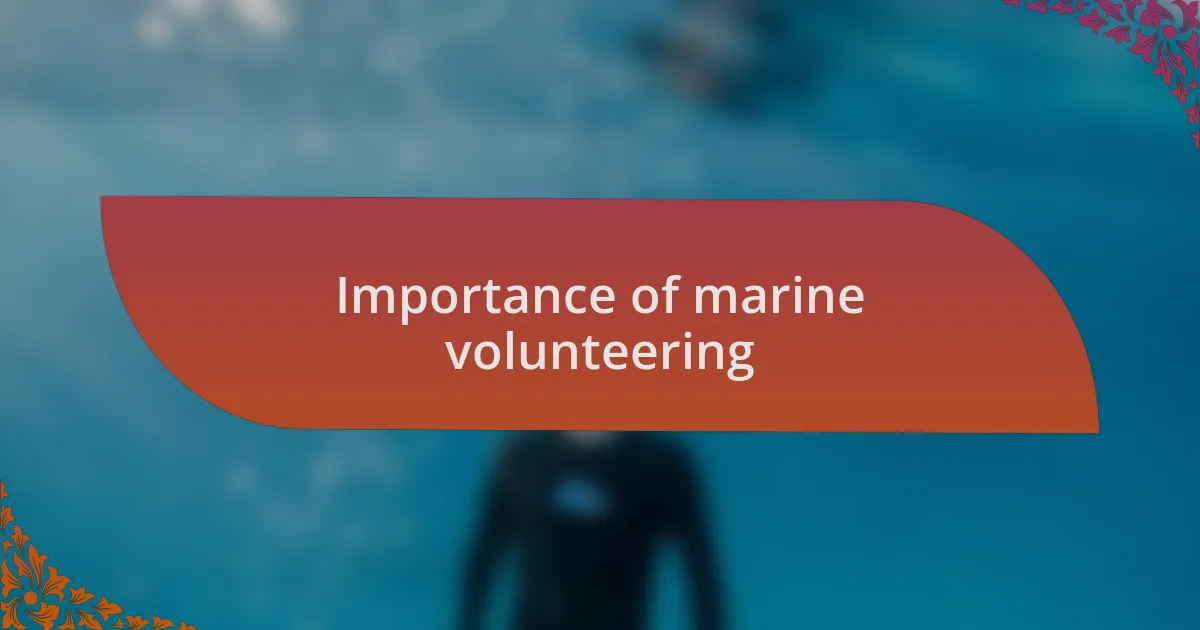
Importance of marine volunteering
Engaging in marine volunteering is more than just a chance to help; it’s about forging a profound connection with the ocean. I remember my first day on a volunteer project, standing knee-deep in crystal-clear water while collecting coral fragments for restoration. That hands-on experience transformed my understanding of marine ecosystems and deepened my appreciation for their complexity. Isn’t it fascinating how being part of such projects can shift our perspective on our responsibility toward these habitats?
Volunteering also amplifies community efforts to protect our oceans and raise awareness. During a workshop, I met fellow volunteers who shared their motivations and experiences, igniting a spark of collective passion. I realized how these shared stories can foster a strong sense of purpose and unity. How can we not be inspired by those who dedicate their time and energy for a greater cause?
Additionally, marine volunteering cultivates valuable skills that extend beyond ocean conservation. I’ve learned to conduct marine surveys and forage for data on local species, connecting ecological knowledge with practical fieldwork. This kind of skill development not only benefits the environment but also enhances personal growth. Have you ever thought about how volunteering can open doors to new opportunities and friendships? It’s a win-win that nurtures both the oceans and our personal journeys.
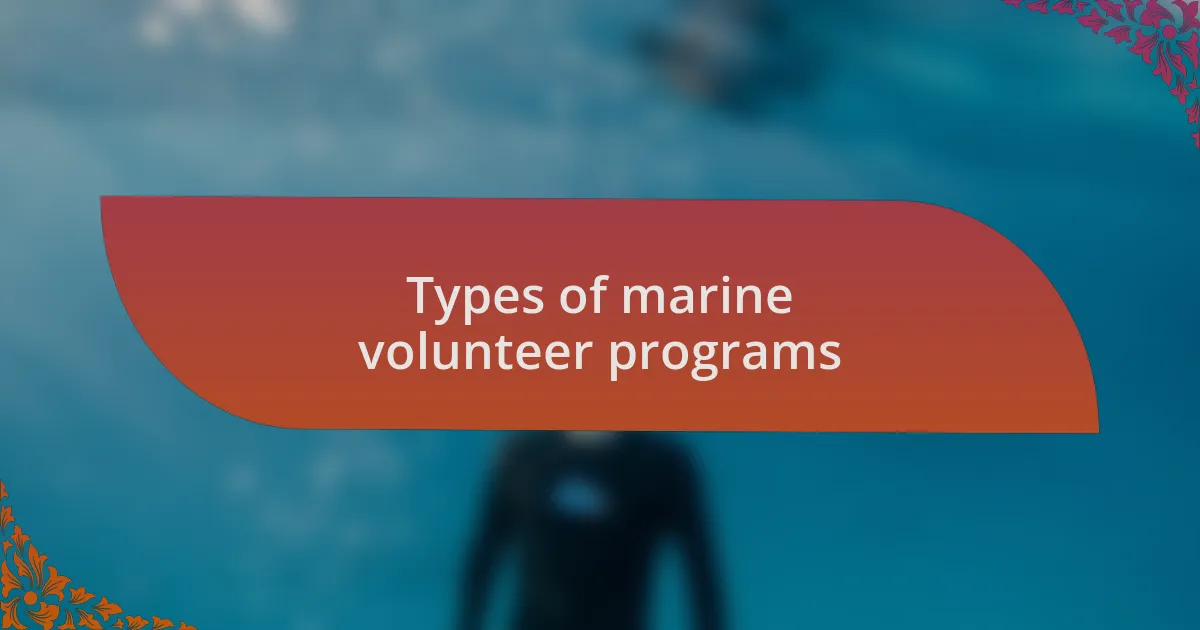
Types of marine volunteer programs
When exploring marine volunteer programs, one popular type focuses on coral reef restoration. I vividly recall spending hours carefully planting coral fragments on the reef. The thrill of knowing that a small piece of my work could contribute to a broader ecosystem recovery was immensely rewarding. Have you ever witnessed a thriving coral community? It’s a breathtaking reminder of nature’s resilience.
Another engaging avenue for marine volunteers includes wildlife research, often involving monitoring endangered species such as sea turtles. I had the chance to participate in nesting surveys along the coastline. As I observed turtles laying their eggs under the moonlight, a sense of wonder washed over me. How many people can say they’ve been so close to such an ancient, majestic species?
Lastly, there are programs dedicated to marine education and community outreach. I found myself leading beach clean-ups while engaging with locals about the importance of reducing plastic waste. It was a powerful experience, seeing the impact of our actions firsthand and sparking conversations that could lead to lasting change. Have you ever been part of a movement that makes you feel connected not just to the environment, but to your community as well?
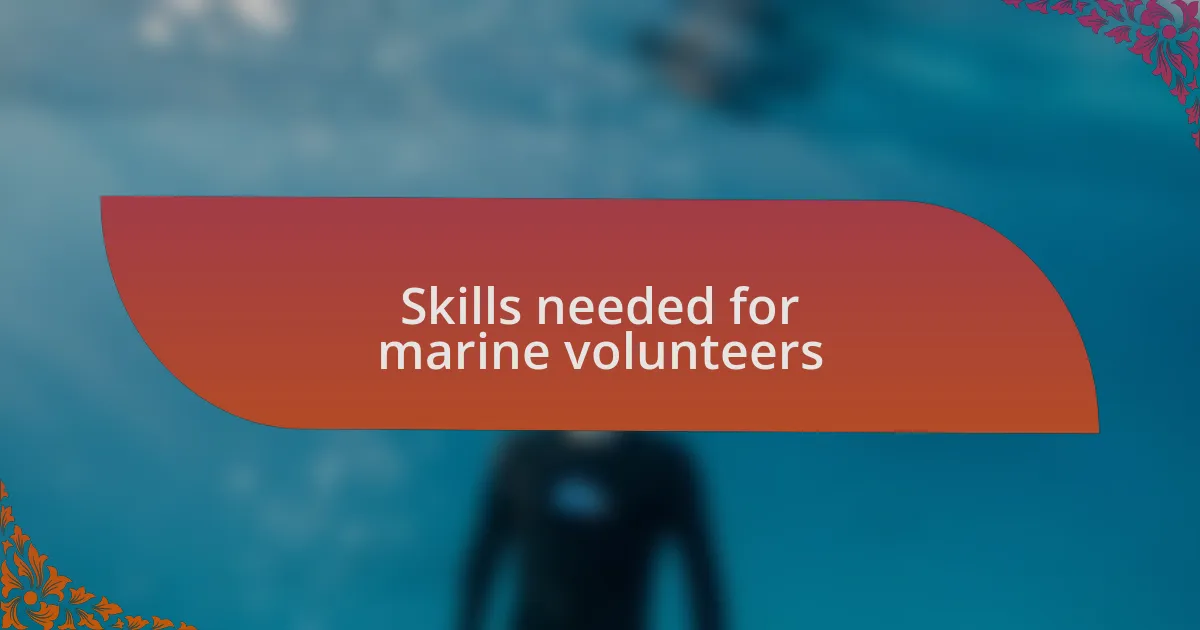
Skills needed for marine volunteers
When it comes to marine volunteering, having strong communication skills is crucial. I remember one time while facilitating a workshop on ocean conservation, I was able to connect with participants by sharing personal stories from my experiences. This not only helped to convey the message more effectively but also fostered a sense of community. How often do you find that sharing a personal touch can create an impactful dialogue?
Another important skill is adaptability. Working in unpredictable environments, like during a beach clean-up after a storm, can test even the most experienced volunteers. I faced challenges such as debris that had washed ashore and changing tides that altered our plans. Being flexible allowed me to problem-solve on the fly and contribute positively, even when everything felt chaotic. Isn’t it fascinating how adaptability can turn potential setbacks into learning opportunities?
Finally, a solid understanding of marine ecology is invaluable. During my time volunteering, I found that having background knowledge helped me appreciate the ecosystems we worked in. For instance, being able to identify local species enriched my interactions with them, making every dive or beach walk an educational experience. How much more fulfilling do you think it is to connect with the marine environment when you truly understand its intricacies?

Challenges faced during volunteering
Volunteering in marine conservation often brings unexpected challenges that can test one’s resilience. I vividly recall encountering a moment when I was part of a team surveying a coral reef; the visibility was poor due to high sedimentation. It was frustrating to know that critical data was slipping away, making me feel somewhat powerless in that moment. Have you ever experienced the weight of limitations in a situation where you deeply wanted to contribute?
Another significant challenge was the physical demands of the work. During a recent dive cleanup, I misjudged the weight of the trash bags we were collecting. Each bag felt heavier than the last, pulling at my muscles and exhausting my spirit. I still vividly remember the ache in my arms mixed with the satisfaction of contributing to a healthier ocean. How often do we underestimate the sheer effort required in conservation work that demands both physical strength and mental endurance?
One issue that consistently arises is the emotional toll of witnessing environmental damage firsthand. I remember a beach clean-up where we collected numerous plastic items, and I felt disheartened seeing our beautiful shorelines littered with debris. It’s a stark reminder of the ongoing battle we face. Have you ever felt a sense of despair when confronted with environmental issues? Oddly enough, these emotional challenges have only motivated me more to advocate for change, proving that vulnerability can catalyze action.
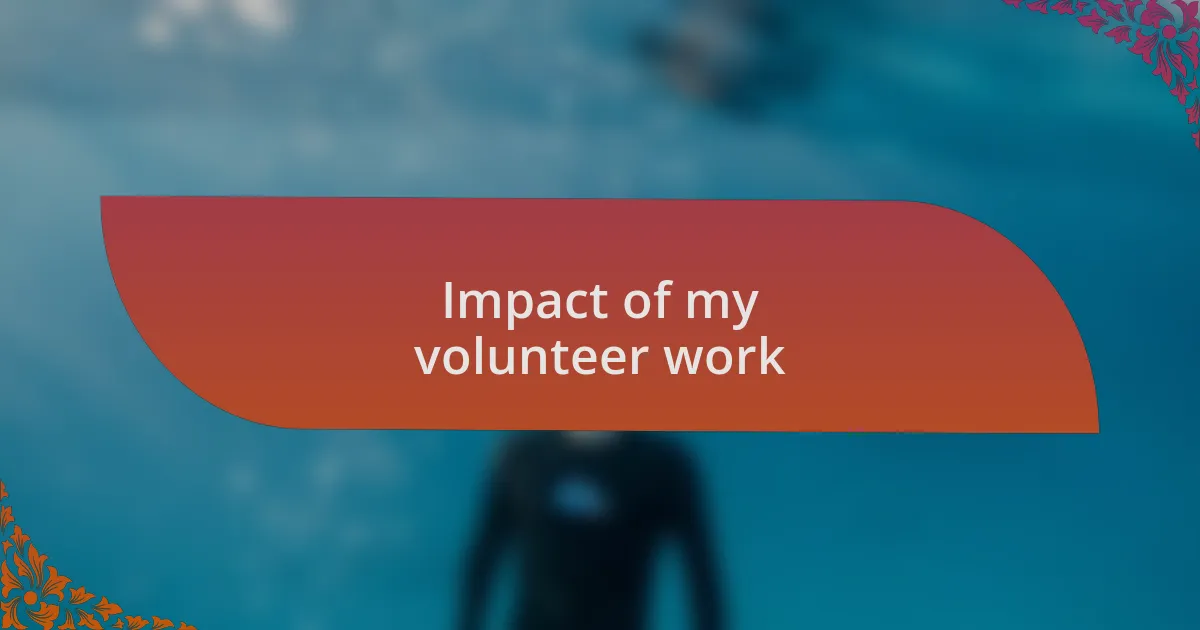
Impact of my volunteer work
The impact of my volunteer work has been profound, reshaping my perspective on ocean conservation. I remember leading a workshop for local communities about the importance of coral reefs. Seeing the light in their eyes as they grasped the concepts made me realize that education is as crucial as physical cleanup efforts. Have you ever felt that rush of fulfillment when sharing knowledge and sparking change in others?
One notable achievement during my time as a marine volunteer was participating in a sea turtle rehabilitation project. When we released the turtles back into the ocean, the sense of joy and accomplishment was infectious. It was a small but vital contribution to restoring a fragile ecosystem. How often do we underestimate the significance of each small act in the grand scheme of environmental conservation?
The relationships I built with fellow volunteers also had a lasting impact. Sharing stories and experiences fostered a sense of community and purpose. We faced many struggles together, but knowing we were united in our mission made all the difference. Have you ever noticed how collaboration can amplify the effectiveness of your efforts? In my case, it created a ripple effect that extended beyond our initial goals, inspiring even more people to get involved in marine conservation.